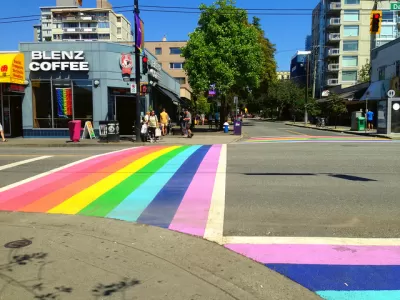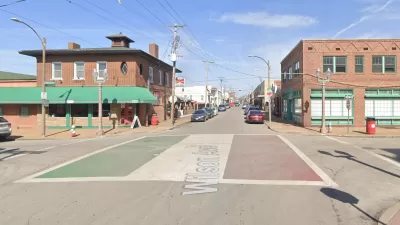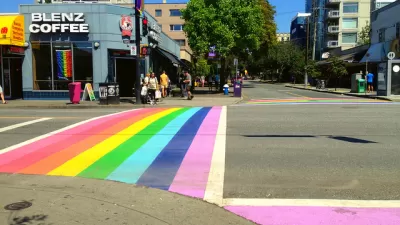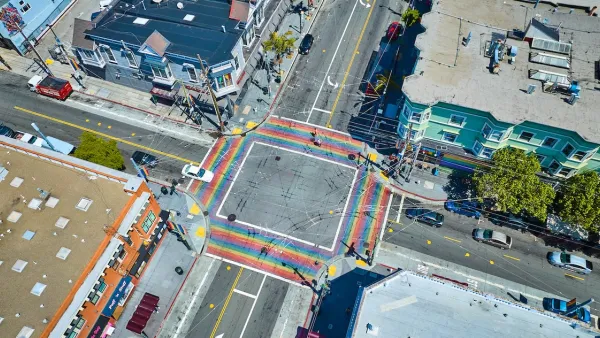As the Federal Highway Administration continues its anti-painted crosswalk crusade, attracting new attention at the national level, cities are resisting the notion that rainbow crosswalks are a safety liability.

In recent years, the Federal Highway Administration has targeted rainbow crosswalks as a safety risk, running afoul of federal regulations. The issue has come up in Lexington, Kentucky and, with a painted crosswalk program (not just rainbows) in St. Louis. The most recent controversy, in Ames, Iowa, attracting national media attention.
Emily S. Rueb reports:
Ahead of an annual L.G.B.T.Q. festival in Ames, Iowa, members of the City Council decided to liven up a pedestrian crosswalk near the downtown shopping district by painting stripes in colors evoking the gay, nonbinary and transgender pride flags.
Then:
But in early September, about a week after The Ames Tribune covered the cheerful ribbon-cutting ceremony, a letter arrived from the federal government: The motley intersection was a safety concern, it said, and a liability for the city.
The letter also included a request for the city to remove the crosswalk. The Ames City Council voted unanimously to ignore that request.
Just the idea of such a request prompted a response in Atlanta, according to an article by Stephen Deere. "The federal government has not asked the city of Atlanta to remove the rainbow crosswalks at 10th Street and Piedmont Avenue, but even if it did, the city wouldn’t comply, said a spokesman for Mayor Keisha Lance Bottoms."
In response to the continued anti-painted crosswalk actions of the Federal Highway Administration, former Streetsblog Editor Angie Schmitt took to Twitter to call out the hypocrisy of traffic safety policy in the United States.
Literally U.S. DOT: The thing on the left is fine and acceptable. The thing on the right is a safety hazard. pic.twitter.com/RapqffOR2p
— Angie Schmitt (@schmangee) October 7, 2019
FULL STORY: The Government Says Rainbow Crosswalks Could Be Unsafe. Are They Really?

Planetizen Federal Action Tracker
A weekly monitor of how Trump’s orders and actions are impacting planners and planning in America.

Chicago’s Ghost Rails
Just beneath the surface of the modern city lie the remnants of its expansive early 20th-century streetcar system.

San Antonio and Austin are Fusing Into one Massive Megaregion
The region spanning the two central Texas cities is growing fast, posing challenges for local infrastructure and water supplies.

Since Zion's Shuttles Went Electric “The Smog is Gone”
Visitors to Zion National Park can enjoy the canyon via the nation’s first fully electric park shuttle system.

Trump Distributing DOT Safety Funds at 1/10 Rate of Biden
Funds for Safe Streets and other transportation safety and equity programs are being held up by administrative reviews and conflicts with the Trump administration’s priorities.

German Cities Subsidize Taxis for Women Amid Wave of Violence
Free or low-cost taxi rides can help women navigate cities more safely, but critics say the programs don't address the root causes of violence against women.
Urban Design for Planners 1: Software Tools
This six-course series explores essential urban design concepts using open source software and equips planners with the tools they need to participate fully in the urban design process.
Planning for Universal Design
Learn the tools for implementing Universal Design in planning regulations.
planning NEXT
Appalachian Highlands Housing Partners
Mpact (founded as Rail~Volution)
City of Camden Redevelopment Agency
City of Astoria
City of Portland
City of Laramie





























